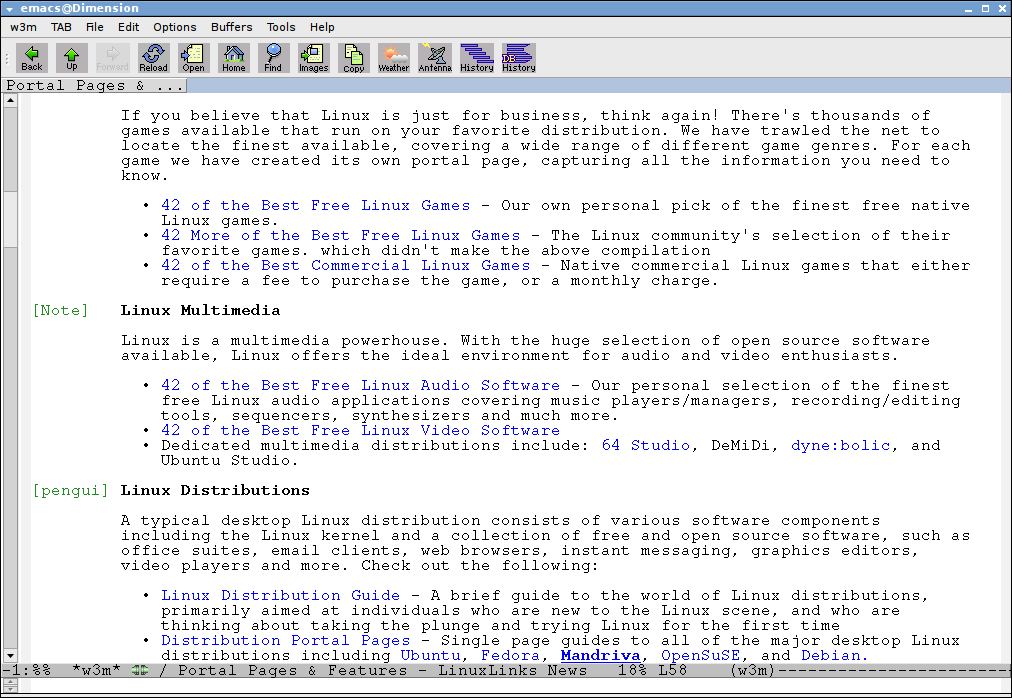Last Updated on July 10, 2021
GNU Emacs is an extensible, customizable, self-documenting text editor.
Emacs is a highly advanced text editor, providing users with much more than simple insertion and deletion. This large, complex application does everything from editing text to functioning as a complete development environment.
It can control subprocesses, indent programs automatically, show two or more files at once, and edit formatted text. Emacs editing commands operate in terms of characters, words, lines, sentences, paragraphs, and pages, as well as expressions and comments in various programming languages.
The software has been in development for more than 30 years.
Features include:
- Content-sensitive editing modes, including syntax coloring, for a wide variety of file types including plain text, source code, and HTML.
- Highly customizable, using Emacs Lisp code or a graphical customization interface.
- Multiple buffers.
- Support for Drag-and-drop.
- Unicode support.
- Images, toolbar, tooltips.
- Complete built-in documentation, including a tutorial for new users.
- A large number of extensions that add additional functionality. Many of these extensions are distributed with Emacs; others are available separately. They include:
- Calc, a powerful RPN numerical calculator.
- Calendar-mode, for keeping appointment calendars and diaries.
- Dunnet, a text adventure originally coded in 1983.
- Ediff, for working with diff files interactively.
- Eliza, a computerized psychiatrist.
- Emerge, for comparing files and combining them.
- ERC, an IRC client.
- Gnus, a full-featured newsreader and email client.
- VM (or ‘View Mail’), a full-featured email client.
- MULE, MultiLingual extensions to Emacs, allowing editing text written in multiple languages.
- Info, an online help-browser.
- Planner, a personal information manager.
- SES, a spreadsheet.
- w3m, a web browser with support for tables, frames, SSL connections, color and even inline images on suitable terminals; Emacs also has a native web browser (Emacs/W3).
- Support for using X displays and text terminals in one session, and for running as a daemon.
- Support for multi-file commits in distributed version-control systems (VC-dir).
- Strong multi-lingual support, including all the European “Latin” scripts, Russian, Greek, Japanese, Chinese, Korean, Thai, Vietnamese, Lao, Ethiopian, and some Indian scripts.
Website: www.gnu.org/software/emacs
Support: Manuals
Developer: XEmacs community
License: GNU GPL v2

Emacs is written in C and Lisp. Learn C with our recommended free books and free tutorials. Learn Lisp with our recommended free books and free tutorials.
| Popular series | |
|---|---|
| The largest compilation of the best free and open source software in the universe. Each article is supplied with a legendary ratings chart helping you to make informed decisions. | |
| Hundreds of in-depth reviews offering our unbiased and expert opinion on software. We offer helpful and impartial information. | |
| The Big List of Active Linux Distros is a large compilation of actively developed Linux distributions. | |
| Replace proprietary software with open source alternatives: Google, Microsoft, Apple, Adobe, IBM, Autodesk, Oracle, Atlassian, Corel, Cisco, Intuit, and SAS. | |
| Awesome Free Linux Games Tools showcases a series of tools that making gaming on Linux a more pleasurable experience. This is a new series. | |
| Machine Learning explores practical applications of machine learning and deep learning from a Linux perspective. We've written reviews of more than 40 self-hosted apps. All are free and open source. | |
| New to Linux? Read our Linux for Starters series. We start right at the basics and teach you everything you need to know to get started with Linux. | |
| Alternatives to popular CLI tools showcases essential tools that are modern replacements for core Linux utilities. | |
| Essential Linux system tools focuses on small, indispensable utilities, useful for system administrators as well as regular users. | |
| Linux utilities to maximise your productivity. Small, indispensable tools, useful for anyone running a Linux machine. | |
| Surveys popular streaming services from a Linux perspective: Amazon Music Unlimited, Myuzi, Spotify, Deezer, Tidal. | |
| Saving Money with Linux looks at how you can reduce your energy bills running Linux. | |
| Home computers became commonplace in the 1980s. Emulate home computers including the Commodore 64, Amiga, Atari ST, ZX81, Amstrad CPC, and ZX Spectrum. | |
| Now and Then examines how promising open source software fared over the years. It can be a bumpy ride. | |
| Linux at Home looks at a range of home activities where Linux can play its part, making the most of our time at home, keeping active and engaged. | |
| Linux Candy reveals the lighter side of Linux. Have some fun and escape from the daily drudgery. | |
| Getting Started with Docker helps you master Docker, a set of platform as a service products that delivers software in packages called containers. | |
| Best Free Android Apps. We showcase free Android apps that are definitely worth downloading. There's a strict eligibility criteria for inclusion in this series. | |
| These best free books accelerate your learning of every programming language. Learn a new language today! | |
| These free tutorials offer the perfect tonic to our free programming books series. | |
| Linux Around The World showcases usergroups that are relevant to Linux enthusiasts. Great ways to meet up with fellow enthusiasts. | |
| Stars and Stripes is an occasional series looking at the impact of Linux in the USA. | |